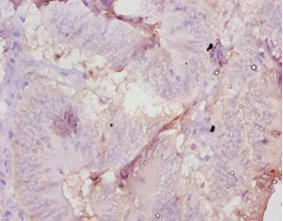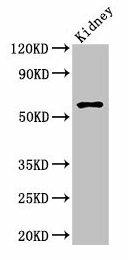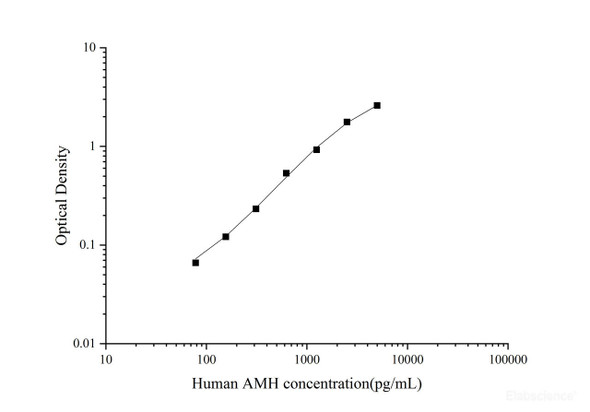Description
| Antibody Name: | Amh Antibody (PACO24892) |
| Antibody SKU: | PACO24892 |
| Size: | 50ug |
| Host Species: | Rabbit |
| Tested Applications: | ELISA, WB, IHC |
| Recommended Dilutions: | ELISA:1:2000-1:10000, WB:1:500-1:5000, IHC:1:10-1:100 |
| Species Reactivity: | Mouse, Human |
| Immunogen: | Recombinant Mouse Muellerian-inhibiting factor protein (450-552AA) |
| Form: | Liquid |
| Storage Buffer: | Preservative: 0.03% Proclin 300 Constituents: 50% Glycerol, 0.01M PBS, PH 7.4 |
| Purification Method: | >95%, Protein G purified |
| Clonality: | Polyclonal |
| Isotype: | IgG |
| Conjugate: | Non-conjugated |
 | Immunohistochemistry of paraffin-embedded human colon cancer using PACO24892 at dilution of 1:10. |
 | Western Blot Positive WB detected in: Mouse kidney tissue All lanes: Amh antibody at 2.7µg/ml Secondary Goat polyclonal to rabbit IgG at 1/50000 dilution Predicted band size: 60 kDa Observed band size: 60 kDa . |
| Background: | This glycoprotein, produced by the Sertoli cells of the testis, causes regression of the Muellerian duct. It is also able to inhibit the growth of tumors derived from tissues of Muellerian duct origin. |
| Synonyms: | Muellerian-inhibiting factor (Anti-Muellerian hormone) (AMH) (Muellerian-inhibiting substance) (MIS), Amh |
| UniProt Protein Function: | AMH: This glycoprotein, produced by the Sertoli cells of the testis, causes regression of the Muellerian duct. It is also able to inhibit the growth of tumors derived from tissues of Muellerian duct origin. Defects in AMH are the cause of persistent Muellerian duct syndrome type 1 (PMDS1). PMDS1 is a form of male pseudohermaphroditism characterized by a failure of Muellerian duct regression in otherwise normal males. Belongs to the TGF-beta family. |
| UniProt Protein Details: | Protein type:Secreted, signal peptide; Secreted Cellular Component: cytoplasm; extracellular space Molecular Function:hormone activity; receptor binding; transforming growth factor beta receptor binding Biological Process: activation of NF-kappaB transcription factor; cell-cell signaling; Mullerian duct regression; preantral ovarian follicle growth; urogenital system development |
| NCBI Summary: | This gene is a member of the transforming growth factor-beta superfamily of growth and differentiation factors. The encoded protein is produced in fetal Sertoli cells during male gonadal differentiation. The protein binds to the anti-Mullerian hormone receptor type 2 and causes the regression of Mullerian ducts in developing male embryos. In humans, some mutations in this gene are associated with persistent Mullerian duct syndrome (PMDS). [provided by RefSeq, Apr 2013] |
| UniProt Code: | P27106 |
| NCBI GenInfo Identifier: | 127110 |
| NCBI Gene ID: | 11705 |
| NCBI Accession: | P27106.1 |
| UniProt Related Accession: | P27106 |
| Molecular Weight: | 11.3 kDa |
| NCBI Full Name: | Muellerian-inhibiting factor |
| NCBI Synonym Full Names: | anti-Mullerian hormone |
| NCBI Official Symbol: | Amh |
| NCBI Official Synonym Symbols: | MIS |
| NCBI Protein Information: | muellerian-inhibiting factor |
| UniProt Protein Name: | Muellerian-inhibiting factor |
| UniProt Synonym Protein Names: | Anti-Muellerian hormone; AMH; Muellerian-inhibiting substance; MIS |
| Protein Family: | Muellerian-inhibiting factor |
| UniProt Gene Name: | Amh |
| UniProt Entry Name: | MIS_MOUSE |
| ELISA Kits |
| Mouse AMH (Anti-Mullerian Hormone) CLIA Kit (MOES00079) |
| Mouse Muellerian-inhibiting factor (Amh) ELISA Kit |
| Secondary Antibody |
| Anti-HRP Goat Anti-Rabbit IgG (H+L) Antibody (CABS014) |
| Recommended Products |
| Anti-FITC Goat Anti-Rabbit IgG (H+L) Antibody (CABS011) |
| Anti-HRP-conjugated Beta Actin Antibody (CABC028) |






